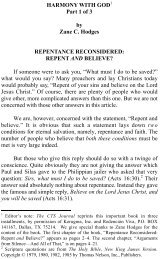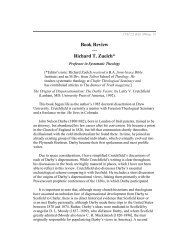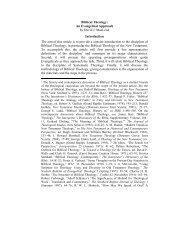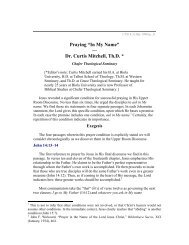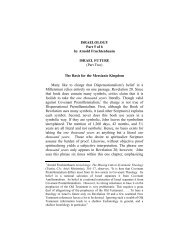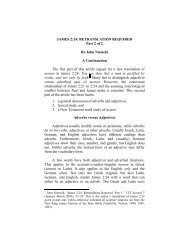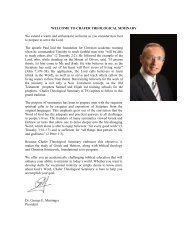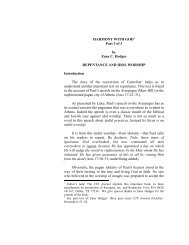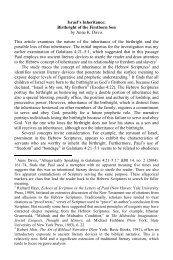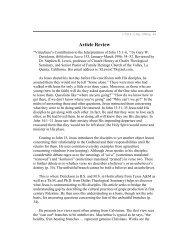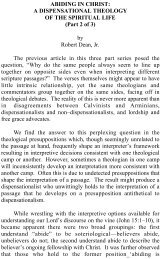Is Belief in Eternal Security Necessary for Justification? - Chafer ...
Is Belief in Eternal Security Necessary for Justification? - Chafer ...
Is Belief in Eternal Security Necessary for Justification? - Chafer ...
Create successful ePaper yourself
Turn your PDF publications into a flip-book with our unique Google optimized e-Paper software.
54 CTS Journal 13 (Spr<strong>in</strong>g 2008)<br />
comes long after the teach<strong>in</strong>g on justification and even progressive sanctification.<br />
Yet its position<strong>in</strong>g be<strong>for</strong>e Romans 12–16 is of paramount importance. Be<strong>for</strong>e a<br />
believer can serve with the proper motive, he must know that he is secure, but a<br />
person does not need to know he is secure to be saved (justified). If he did, Paul<br />
would have <strong>in</strong>cluded the teach<strong>in</strong>g on security at the same time or immediately<br />
after the teach<strong>in</strong>g on justification. Someone could object that security is implicit<br />
<strong>in</strong> the teach<strong>in</strong>g on justification. If so, why <strong>in</strong>clude it at all? To say security is<br />
implicit <strong>in</strong> the faith required <strong>for</strong> justification flies <strong>in</strong> the face of the carefully<br />
constructed order of the book, and aga<strong>in</strong>, it is an argument from silence.<br />
NT Books Other Than John Presume a Fuller Understand<strong>in</strong>g<br />
of the Gospel Than Presented<br />
Speak<strong>in</strong>g of arguments from silence, one of the more egregious is the claim that<br />
because a book or epistle is written to believers, its readers had a<br />
preunderstand<strong>in</strong>g of gospel truths to the extent that expressions of the gospel <strong>in</strong><br />
these writ<strong>in</strong>gs are <strong>in</strong>sufficient to justify the hearers. Of course, this is an<br />
argument from silence, but as already po<strong>in</strong>ted out, it assumes that a book like<br />
Acts was written to a believer, which cannot be proven. The preach<strong>in</strong>g to<br />
Cornelius is a case <strong>in</strong> po<strong>in</strong>t. He is a God-fearer, a Gentile attracted to Yahweh<br />
(10:22). Peter, who ought to know, says that Jesus and the disciples went around<br />
<strong>Is</strong>rael preach<strong>in</strong>g peace (a “what,” not a “how” or a “why”). He goes on to preach<br />
the resurrection (10:40), <strong>for</strong>giveness of s<strong>in</strong>s (10:43), and faith alone (10:43).<br />
Never does he mention “eternal life,” or even the word “life.” And he certa<strong>in</strong>ly<br />
does not reference anyth<strong>in</strong>g that might be construed to be tantamount to eternal<br />
security. To suppose that eternal security comes out of the concept of<br />
resurrection is a major leap. Resurrection does not prove eternal security.<br />
Spiritual life with God does not prove eternal security. The fallen angels had<br />
spiritual life with God, but not eternal security. They were cast away—out of His<br />
presence <strong>for</strong>ever.<br />
Nevertheless, the Holy Spirit fell upon these Gentiles at the house of<br />
Cornelius while Peter was preach<strong>in</strong>g the message of <strong>for</strong>giveness of s<strong>in</strong>s. To argue<br />
that we do not have the complete message given by Peter, which might have<br />
conta<strong>in</strong>ed a fuller expression of the gospel, and specifically words perta<strong>in</strong><strong>in</strong>g to<br />
“life,” is another argument from silence. Peter makes it clear that the Holy Spirit<br />
fell upon and baptized these hearers who believed (11:15–17) when he “began to<br />
speak.”<br />
Paul preached a similar message at Antioch <strong>in</strong> Pisidia (Acts 13). When he got<br />
to the good news about Jesus, Paul camped on resurrection truth (13:30–37). He<br />
then preached “the <strong>for</strong>giveness of s<strong>in</strong>s” and that anyone who “believed” <strong>in</strong> Jesus<br />
was “justified” (13:38–39). Then Luke tells us that these believers received<br />
“eternal life” (13:48). To say that Luke did not give a complete render<strong>in</strong>g of what<br />
was said just because the readers of Acts were believers with a preunderstand<strong>in</strong>g<br />
of the complete message stretches credulity. We either have an accurate record of<br />
what was said or we do not. All those who believe <strong>in</strong> the <strong>in</strong>spiration and<br />
<strong>in</strong>errancy of the Word will concede that we have an accurate record. But to say



